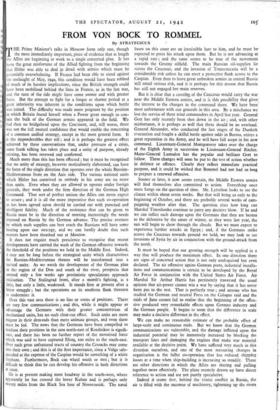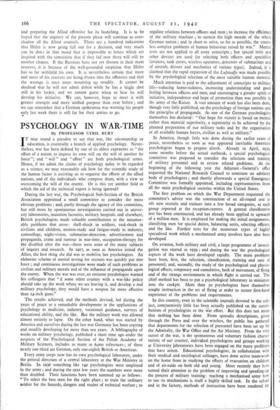FROM VON BOCK TO ROMMEL
By STRATEGICUS had then no bridgehead upon the Continent, and, still worse, there was not the full mutual confidence that would enable the concerting of a common unified strategy, except in the most general form. It is the imponderables that tell ; and it is perhaps the greatest effect achieved by these conversations that, under pressure of a crisis, some frank talking has taken place and a unity of purpose, already existing, has been renewed and confirmed.
Much more than this has been effected ; but it must be recognised that no unity of strategy, however meticulously elaborated, can have the force of the single direction that operates over the whole Russian- Mediterranean front on the Axis side. The various national units which Hitler has contrived to embody in his army are no more than units. Even when they are allowed to operate under foreign generals, they work under the firm direction of the German High Command. That sort of perfect unison the Allies can never expect to secure ; and it is all the more imperative that such co-operation as has been agreed upon should be carried out with punctual and intelligent fidelity. Much of the assistance that can be given to Russia must be in the direction of meeting increasingly the needs imposed on Russia by the German advance. The precise avenues by which such supplies can best reach the Russians will have some bearing upon our strategy, and we can hardly doubt that such matters have been thrashed out at Moscow.
It does not require much prescience to recognise that recent developments have carried the wash of the German offensive towards the threshold of the positions we hold in the Middle East. Indeed, It may not be long before the strategical unity which characterises the Russian-Mediterranean theatre will be transformed into a tactical unity. As we watch the development of the German plan in the region of the Don and south of the river, prospects that seemed only a few weeks ago pessimistic speculations approach realisation. The Stalingrad front, after a month's fighting, is a little, but only a little, weakened. It stands firm at present after a bitter struggle ; but the operations on its southern flank threaten to undermine it.
Over this vast area there is no line or series of positions. There are very few communications ; and this, while it might appear to advantage the Germans with their greater concentration of mechanised units, has no such clear-cut effect. Such units are more exigent in their demands than mere animate groups, and even these must be fed. The news that the Germans have been compelled to readjust their positions in the area north-east of Kotelnikov is signifi- cant, and there has been no further report of the motorised force Which was said to have captured Elista, too miles to the south-east. Over such great unfeatured tracts of country the Cossacks may come into their own ; and this is of the first importance, since a Volga safe- guarded at the expense of the Caspian would be something of a white elephant. Furthermore, Bock can wheel south or east ; but it is difficult to think that he can develop his offensive in both directions at once.
He is at present making most headway in the south-west, where apparently he has crossed the lower Kuban and is perhaps only twenty miles from the Black Sea base of Novorossisk. The naval bases on this coast are an irresistible lure to him, and he must be expected to press his attack upon them. But he is not advancing at a rapid rate ; and the same seems to be true of the movement towards the Grozny oilfield. The main Russian oil-supplies lie across the Caucasus, and the invasion of Transcaucasia will be a considerable risk unless he can erect a protective flank across to the Caspian. Even then to leave great unbroken armies in central Russia Will entail serious risk, and it is perhaps for this reason that Russia has still not engaged her main reserves.
But it is clear that a crossing of the Caucasus would carry the war near the Middle Eastern armies, and it is this possibility that gives, the interest to the changes in the command there. We have been'
most unfortunate with our generals in this area. By a mischance we lost the service of three tried commanders in April last year. General Gott has only recently been shot down in the air ; and, with other misfortunes, it is perhaps as well that there should be an overhaul. General Alexander, who conducted the last stages of the Dunkirk evacuation and fought a skilful battle against odds in Burma, enjoys a great reputation in the Army, and he will have full scope in his new corrunand. Lieutenant-General Montgomery takes over the charge of the Eighth Army in succession to Lieutenant-General Ritchie.
Major-General Lumsden has the popular and brilliant Gott to follow. These changes will soon be put to the test of action whether in defence or offence. Clearly they reflect immediate practical purpose, and it could be wished that Rommel had not had so long to prepare a renewed offensive.
Sooner or later, it now seems certain, the Middle Eastern armies will find themselves also committed to action. Everything once more hangs on the question of time. Mr. Lyttelton looks to see the climax within about seven weeks. But that will bring us only to the beginning of October, and there are probably several weeks of cam- paigning weather after that. The question rises how long can Marshal Timoshenko continue to parry any decisive blow. If he and we can inflict such damage upon the Germans that they are beaten to the defensive by the onset of winter, as they were last year, the sun will begin to show through the clouds. But we must expect to experience further attacks in Egypt ; and, if the Germans strike across the Caucasus towards ground we hold, we may look to see invasions of Syria by air in conjunction with the ground-attack from the north.
It must be hoped that our growing strength will be applied in a way that will produce the maximum effect. In one direction there are signs of concerted action that is not only undisguised but even declared. The air offensive agains German ports, industrial installa- tions and communications is certain to be developed by the Royal Air Force in conjunction with the United States Air Force. Air Marshal Sir Arthur Harris has pertinently traversed the usual opinion that air-power cannot win a war by saying that it has never
been put to the test. That is perfectly true ; and anyone who has studied the German and neutral Press on the Cologne raid and the raids of June cannot fail to realise that the beginning of the offen- sive produced very remarkable effects upon German industry and the German people. It begins to seem that the difference in scale may make a decisive difference in the effect.
We can make no reasonable estimate of the probable effect of large-scale and continuous raids. But we know that the German communications are vulnerable, and the damage inflicted upon the industrial potential may be immensely increased by blocking the transport lines and damaging the engines that make war material available at the decisive point. We have suffered very much in this direction ourselves, and one of the most reassuring changes in organisation is the fuller co-operation that has reduced shipping losses at a time when ship-building is increasing so steadily. There are other directions in which the Allies are sharing and pulling together more effectively. The plans recently drawn up have direct reference to action and are not purely speculative.
Indeed it seems that, behind the titanic conflict in Russia, the air is filled with the murmur of machinery, tightening up the rivets and preparing the Allied offensive for its launching. It is to be hoped that the urgency of the present phase will continue to over- shadow all the Allied counsels. There are a hundred indications that Hitler is now going full out for a decision, and very much can be done in that mood that is impossible to forces which are inspired with the conviction that if they fail now there will still be another chance. If the Russians have not yet thrown in their main reserves, it is because of the well-grounded suspicion that Hitler has so far withheld his own. It is nevertheless certain that more and more of his reserves are being drawn into the offensive and that the wastage is once more mounting up steadily. It cannot be doubted that he will not admit defeat while he has a single shot still in his locker, and we cannot guess when or how he will develop his initiative. We can, however, hope to meet it with greater strength and more unified purpose than ever before ; and we can remember that a German spokesman was warning his people only last week there is still far for their armies to go.



























 Previous page
Previous page